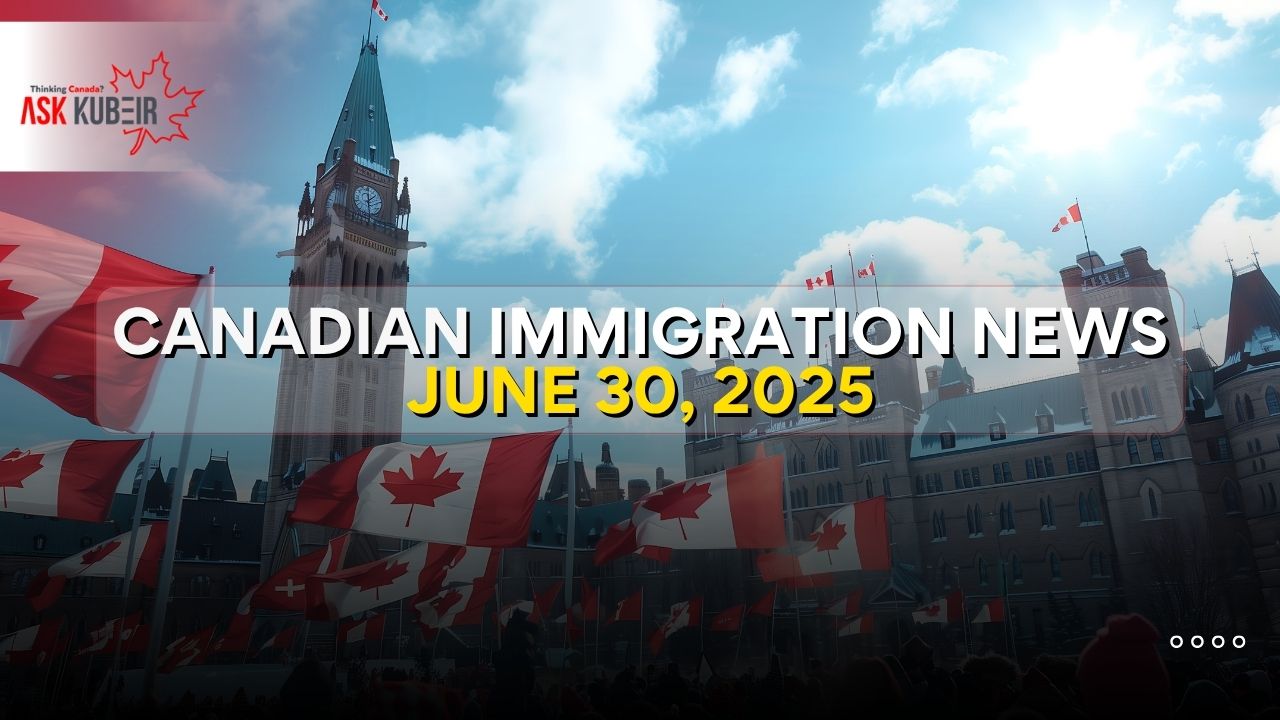
Related Post







PNP or Express Entry?
Canadian Immigration: Understanding Provincial Nominee Program in Contrast to the Express Entry Program.
– by Adnan Kamal
 There are 10 provinces and 3 territories in Canada, and each of these provinces (except Nunavut and Quebec) have their own Provincial Nominee Program (PNP). Each PNP has at least one program stream that is aligned with the federal Express Entry system.
There are 10 provinces and 3 territories in Canada, and each of these provinces (except Nunavut and Quebec) have their own Provincial Nominee Program (PNP). Each PNP has at least one program stream that is aligned with the federal Express Entry system.
Quebec has a separate Immigration program by itself and is no aligned on linked to Express Entry.
The Canadian government made an agreement with local provinces in which they can nominate immigrants who wish to live, settle, and work in that particular province or essentially, immigrate to Canada. Therefore, each province can choose interested candidates who wish to establish their residence in their province and contribute in its growth.
These programs target qualified and skilled workers to meet the province labour market needs. However, some of these programs target specialized workers such as Entrepreneurs and Farmers. There are programs that require you to have a job offer from a Canadian Employer before you can apply.
So how does the Provincial Nominee Program benefit struggling applicants who are waiting for an Invitation to Apply (ITA) in the populated pool of Express Entry?
Is Provincial Nominee Program (PNP) an alternative pathway from the Express Entry (EE)?
Majority of new immigrants who land in Canada are invited through the express entry, so again why is the PNP program important?
I urge you to read on as this could be beneficial for a lot of you.
To immigrate to Canada through the Express Entry you are scored on capital factors such as Age, Education, Work Experience , Language Proficiency and adaptability factors (like siblings, Canadian Education, valid job offer etc).You are provided a Comprehensive Ranking System (CRS) score, which is essentially your ranking score in the Express Entry pool, so that it can compare your profile with others in the pool.
Example #1
An applicant has created and successfully submitted his profile in the Express Entry draw. However, the applicant’s CRS score is 455. The current immigration draws have had minimum score requirements of 469+ CRS score. The applicant will not be invited.
The PNP program offers an alternative pathway to applicants who have lower CRS scores. How does this work in their benefit? Well, the PNP program works on fulfilling a participating province’s labor market needs, and in turn the invited applicant is awarded an additional 600 CRS points on successful nomination.
Example #2
An applicant has relevant work experience as a software developer, the province of Ontario to fulfill its labour market needs is looking for software developers. The province of Ontario will then scan the entire Express Entry pool for qualified and skilled software developers who fall within the decided CRS range. The qualified and skilled software developers, such as the applicant will then be awarded 600 CRS points on nomination.
In this case candidate with a CRS score which otherwise may not have a chance to be invited through the regular Express Entry Draws, will now have a chance to apply for PR, through the Ontario’s Immigrant Nominee Program (OINP – Tech Draw)
Now that you have an overview of PNP as an alternative pathway, shall we discuss your options?
| Job Offer Required | Job Offer Not Required. |
| British Columbia Provincial Nominee Program | Ontario Immigrant Nominee Program |
| Newfoundland and Labrador Provincial Nominee Program | Alberta Immigrant Nominee Program |
| Yukon Nominee Program | Saskatchewan Immigrant Nominee Program |
| New Brunswick Provincial Nominee Program | Nova Scotia Nominee Program |
| Rural and Norther Immigration Pilot Program (RNIP) | Manitoba Provincial Nominee Program |
| Atlantic Immigrant Pilot Program (AIPP) | Prince Edward Island |
As you can see, I have separated the programs in two columns based on the requirement of obtaining a full-time (30 hours+ a week) job offer from an eligible Canadian employer in the province you are applying for. As such all provinces have streams that need a job offer from an employer in the province. However, some provinces as indicated above, also have program streams that do not need any job offer from an employer in the province.
All the above-mentioned programs have their own set of criteria and requirements. Complete information and timely updates on each program can be found on the province + program website. If you are looking to apply through one of these programs it would be smart to bookmark the respective website and sign up for update alerts.

So, do you need this alternative route?
The question to this answer depends on your individual profile, but it is extremely important to understand if this is the best option for you.
Hence, I would advise this route to applicants who are stuck at a “Lower CRS scores” or are unable to work on improving their CRS score.
Wait, what we can improve our CRS scores?
Yes, CRS scores as mentioned earlier are based on capital factors. These factors are not definite and can be improved (except age, obviously, even though we would love to work on that too).
Age: It is no secret that the earlier or the younger you apply, the better it is.
A couple is creating their profile for Express Entry and both individuals share similar qualifications and experience. if one partner is younger than the other, it would be beneficial for your application if the younger individual is the primary applicant. Here, age would help increase your CRS score.
Education: “The more that you read, the more things you will know. The more that you learn, the more places you’ll go.” – Dr. Seuss.
I choose this quote to emphasize the importance of education and learning. If you hold a bachelor’s degree and can afford holding off your application for 1 year. An additional degree (diploma/certificate) will push your CRS scores, and it would make you more qualified than you were with your previous knowledge and education.
Work Experience: Applicants with 3+ years of work experience are very common, however if you are an applicant with only 1-2 years of experience, you can add that extra 1 year to get a considerable boost in your CRS scores.
Language Proficiency (IELTS/TEF/TCF): This is one factor where every applicant applying through the Express Entry can work and achieve better results to improve their CRS score.
As an applicant you are stuck at a CLB 7 or CLB 8. You can retake your IELTS Exam and improve on each section. How is it beneficial? You get additional points for increasing your score in each section. So, what’s stopping you from getting that CLB 9 or even a CLB 10?
If that was not enough, adding French as second language can also be extremely beneficial for your profile and as per the recent change in the process obtaining proficiency in French as second language has huge incentive with almost 74 additional CRS points up for grabs
These are all the ways you can increase your CRS score without deviating from the Express Entry Pool.
The PNP program in all its greatness has the following reasons that would motivate a lot of applicants to increase their CRS scores.
- Cost more money
- Takes considerably longer than Express Entry
- Difficult to qualify for nomination if your occupation is not in demand
For these very reasons I felt the need to mention all the ways you can improve your CRS scores while staying in the Express Entry pool. The PNP program becomes a viable alternative for those applicants who have tried to increase their CRS scores but are unable too.
Another important aspect of the PNP program is related to an applicants ethical and moral responsibility. What am I talking about? I’m talking about qualifying for a province you really did not want to be in.
Example #3
As an applicant, Mr. John Doe qualified for provincial nomination in Alberta. But John has family living in Toronto, Ontario. John now conflicted, thinking, does he really have to stay in Alberta? Who is going to check?
To be able to activate his Permanent Residence, John will have to land in Canada while maintaining his intent to reside in Alberta, as a mandatory requirement. However, there is no law that will stop John from moving to another province of his choice. the Canadian Charter of Rights and Freedom, under its mobility rights allows mobility rights to all residents and gives them freedom to live and work anywhere in Canada.
This is where the ethical and moral responsibility of an applicant comes in. The PNP program is designed to satisfy the province’s labour market needs. As an applicant who could not make it in the Express Entry, you receive a nomination from a province that requires your job profile.
So even though John is not bound by law, it is advisable for him to stay in the province for as long as possible and realistically give that province a chance to setup his life and residence. In these few months, Alberta may become a new home and if his is still unhappy and is unable to find any jobs in the province, then he may move to any other location of his choice.
It is highly suggested that you document your journey in the province of finding jobs and efforts to establish your residence. While Charter protects your mobility rights, however, it is misrepresentation to have lied in your PR application as to your actual intention of residing in a province.

Links for different PNP program websites can be found here:
#foreverhopeful
